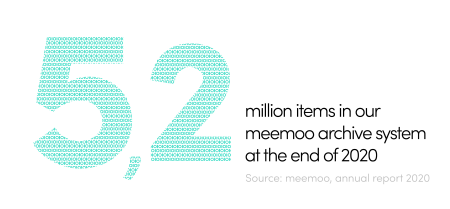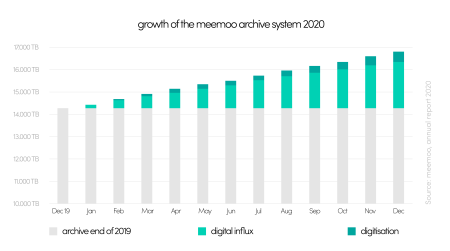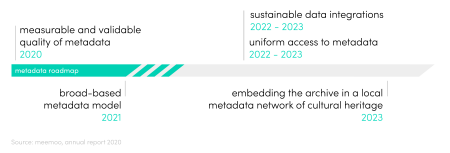2020 in brief: archiving
There’s no escaping the fact that 2020 was an unforgettable year with all kinds of challenges. But we didn’t let that stop us: as our archive continued to grow, we also laid the foundations for a revised metadata model and reviewed our storage method.
… in figures
Our partners face all kinds of challenges when it comes to the sustainable storage of their content. Fortunately, they can always count on us to safeguard their valuable objects. In 2020, we welcomed over 970,000 new items. This saw our archive system grow by 2.48 PB. To add some context: 2.48 PB is enough for 115,000 hours of media files with a further 650,000 photographs on top! (For reference: there are 8,760 hours in a non-leap year).

Furthermore, in 2020 we surpassed the historical milestone of 5 million archived items! On 31 December 2020, our archive system was home to a total of 5.2 million items, accounting for 16.3 PB. This equates to a growth of 18% compared to 2019.
We can attribute this growth to our digitisation projects and the influx of born-digital content and digitised archive collections. Read more about digitisation in 2020 here. This second element, the influx from digital collections, represented the majority of the growth in our meemoo archive system in 2020, accounting for 2.04 PB.
Both VRT and Meise Botanic Garden fed in lots of items from digital collections in 2020. The 163,000 objects that we received from VRT accounted for just over 1.9 PB, and the impressive 580,000 plant scans from Meise Botanic Garden amounted to 60 TB.

… in service provision
As you’ve already read above, the meemoo archive system grew considerably thanks to our content partners’ collections. We therefore offered them extra support in this coronavirus year, for example by providing metadata set exports, so they could continue to work on adding metadata to their collections.
We also made an inventory of the formats in our archive in 2020, making it easier for our content partners to select what they can feed into our system. 2020 also saw us work diligently on an initial report into the distribution of MIME types and carry out an analysis of more detailed reporting. These reports will be extended in 2021.
Storage technology is constantly changing, resulting in cost contributions being recalculated, which in turn led to a reduced rate for our content partners in 2020.
Another important change in our service provision in 2020, incorporated in this new cost calculation, was our switch from LTO6 tapes to a new generation of tapes: LTO8. In concrete terms, we can store almost 12 TB of additional content per LTO8 tape, which increases our storage capacity from 17 PB to 70 PB. We’ve been adding new content to LTO8 tapes since June 2020, and the process for migrating existing content was also developed further in 2020 and will continue incrementally. We will start with regional broadcasters in 2021.
… in metadata
In addition to audio, video and graphical files, we also collect metadata from over 160 content partners. Metadata makes content easier to find and search, so it’s essential for our various access platforms. This important information doesn’t currently arrive in a uniform way, which is why we’ve been working to develop a metadata roadmap, focusing on five ambitious horizons:
the measurable quality of metadata;
revising the metadata model;
sustainable data integrations;
the infrastructure;
embedding this model in the local cultural heritage network.
This process is running from 2020 until 2023, and we’ve already delivered a first version of the report on the presence of metadata, including an analysis of the existing metadata and its quality. You can find the schedule for the full process here.

This roadmap was presented to our content partners at our virtual partner event in November 2020.
In 2020, a significant amount of material entered our archive system. At meemoo, we want to encourage the reuse of this archived material in all its forms, together with our content partners. That is no different in 2020!
>> Read about interaction in 2020